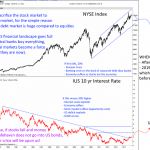Yesterday, when stocks surged at the market open following Politico’s report that Trump is unexpectedly “making strides” on tax reform, we warned that “it can all be wiped away as soon as tonight, when Trump will deliver a speech to his “base”, in which he may promptly burn any of the goodwill he created with capital markets following his far more conventional Afghanistan speech last night.” That’s precisely what happened, because on Tuesday night, in another fiery campaign rally, Trump fiercely defended his response to violence in Charlottesville, made passing remarks from a teleprompter about the need for unity and inclusion before veering off-script to attack the news media, Democrats and even Republicans in the Senate whom he accused of distorting his response and blocking his agenda.
But what spooked markets, and what has sent both US futures and European stocks lower, was Trump’s threat to bring the U.S. government to the brink of a shutdown if needed to pressure Congress into funding the border wall that was a centerpiece of his 2016 campaign, stoking renewed fears that the debt ceiling debate will be far more contentious that the market expects.
Delivering a warning to Democratic lawmakers who have objected to his plans to construct a wall along the U.S.-Mexico frontier, Trump called them “obstructionists” and said that it was time for the U.S. to crack down on illegal immigration. “If we have to close down our government, we’re building that wall,” Trump told thousands of supporters gathered in Phoenix for a campaign-style rally. “One way or the other, we’re going to get that wall.” As Trump spoke, S&P500 futures reversed gains to slip as much as 0.3% as Trump spoke.
As Bloomberg notes, Trump has asked for $1.6 billion to begin construction of the wall, with Congress under pressure to pass some kind of spending bill to keep the government open after Sept. 30. But Republicans in Congress haven’t shown much appetite for fighting to spend potentially billions more on a border barrier either. The funding would add to the deficit at the same time Republicans are trying to figure out how to pay for tax cuts.
Separately, the yen strengthened, while the Mexican peso weakened 0.2 percent as the president also said he might terminate the North American Free Trade Agreement at some point: “Personally, I don’t think we can make a deal because we have been so badly taken advantage of. They have made such bad deals, both of the countries, but in particular Mexico, that I don’t think we can make a deal. So I think we’ll end up probably terminating Nafta at some point. I personally don’t think we can make a deal without termination, but we’ll see.”
“His comments on the NAFTA negotiations once again brings the general direction toward obstructing free trade, and raises concerns over its impact on global trade,” said Hideyuki Ishiguro, a senior strategist at Daiwa Securities Co. in Tokyo.
Still, despite the latest Trump bluster, the hope for tax reform wasn’t completely killed: during his speech Trump repeated his call for a historic tax cut, promising to pass the “first major tax reform in over 30 years.” While he provided no details of any planned legislation, he urged congressional Democrats to support it. Democratic senators in states he won should be particularly wary, Trump said. Most Senate Democrats have said they’ll refuse to support any tax legislation that provides a tax cut to the highest earners. “The Democrats are going to find a way to obstruct,” Trump said. If so, he told his supporters, they’ll be preventing Americans from receiving a “massive tax cut.” Unlike healthcare, tax reform is a less divisive issue among Republicans and could represent Trump’s first major legislative victory, if it were to pass, although in light of recent reports of a collapse in relations between Trump and Mitch McConnell, even that now looks improbable.
Putting it all together, on Wednesday morning S&P futures are down 0.24%, alongside with European shares and oil. The Yen gained versus all G-10 peers as investors sought safer assets after Trump threatened to bring the U.S. government to the brink of a shutdown if needed to pressure Congress into funding the border wall that was a centerpiece of his 2016 campaign, and threatened to terminate NAFTA at some point.
“The Nafta hot air may be as much an excuse to take a step back after Wall Street’s surge yesterday, as it is a legitimate concern about the president not appreciating nuances of inter-dependence embedded in trade deals,” said Vishnu Varathan, head of economics and strategy at Mizuho Bank Ltd. in Singapore. “The ‘she loves me, she loves me not’ thought process could lead to on-off markets”
Elsewhere, treasury futures marginally firmer; the Kiwi fell sharply after New Zealand cut growth and budget forecasts; the Korean won climbed for third day. HKEX cancels trading due to Typhoon Hato; The Nikkei rose for first time in six days. In China, the PBOC drained net 40 billion yuan in open market operations although the overnight money market rate spike to two-year high turned out to be inaccurate due to a “faulty print” although iron ore slumps 5.2% after steel rebar sinks.WTI crude drifts sideways near $47.70;
The euro was the standout gainer in an otherwise listless day in markets, as strong European data boosted confidence in the region’s growth, while a speech by Mario Draghi, seen as a preview to his Jackson Hole address, did not unveil any new dovish message/policy shift, and instead underscored the recent European strength. Gold and yen benefited as comments from President Donald Trump provoked another bout of investor caution. The surprise gain in the European PMI index, however, did little to spur the Stoxx Euro 600 Index, which retreated led by WPP Plc after the world’s largest advertising company cut its revenue forecast.














Leave A Comment